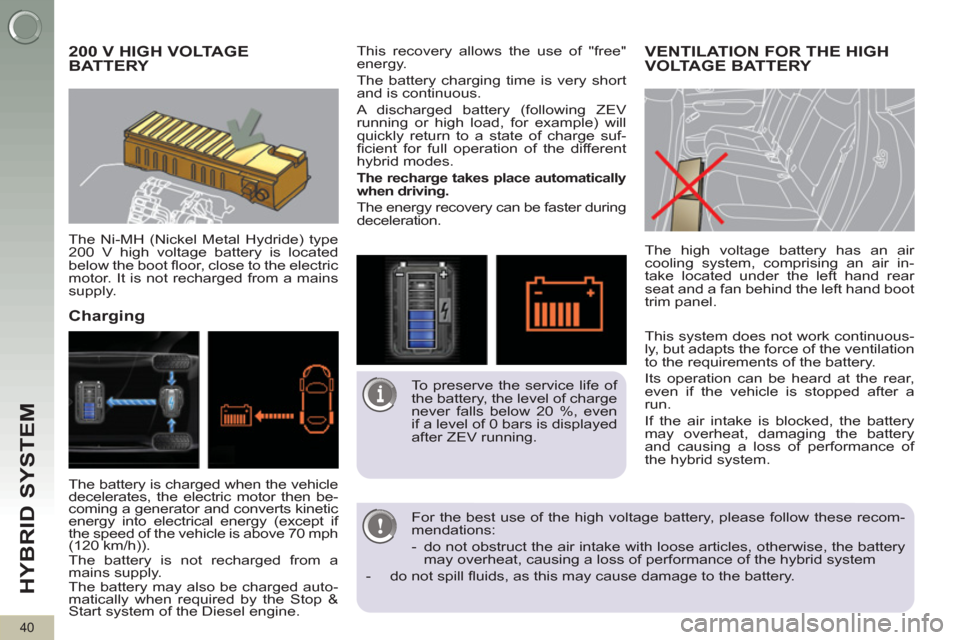Page 42 of 284

HYBRID SYSTEM
40
200 V HIGH VOLTAGE
BATTERY
The Ni-MH (Nickel Metal Hydride) type
200 V high voltage battery is located
below the boot fl oor, close to the electric
motor. It is not recharged from a mains
supply.
Charging
This recovery allows the use of "free"
energy.
The battery charging time is very short
and is continuous.
A discharged battery (following ZEV
running or high load, for example) will
quickly return to a state of charge suf-
fi cient for full operation of the different
hybrid modes.
The recharge takes place automatically
when driving .
The energy recovery can be faster during
deceleration.
This system does not work continuous-
ly, but adapts the force of the ventilation
to the requirements of the battery.
Its operation can be heard at the rear,
even if the vehicle is stopped after a
run.
If the air intake is blocked, the battery
may overheat, damaging the battery
and causing a loss of performance of
the hybrid system.
VENTILATION FOR THE HIGH
VOLTAGE BATTERY
For the best use of the high voltage battery, please follow these recom-
mendations:
- do not obstruct the air intake with loose articles, otherwise, the battery
may overheat, causing a loss of performance of the hybrid system
- do not spill fl uids, as this may cause damage to the battery.
The battery is charged when the vehicle
decelerates, the electric motor then be-
coming a generator and converts kinetic
energy into electrical energy (except if
the speed of the vehicle is above 70 mph
(120 km/h)).
The battery is not recharged from a
mains supply.
The battery may also be charged auto-
matically when required by the Stop &
Start system of the Diesel engine.
To preserve the service life of
the battery, the level of charge
never falls below 20 %, even
if a level of 0 bars is displayed
after ZEV running.
The high voltage battery has an air
cooling system, comprising an air in-
take located under the left hand rear
seat and a fan behind the left hand boot
trim panel.
Page 50 of 284

48
INSTRUMENTS and CONTROLS
Warning lamp
is on
Cause
Action/Observations
Diesel engine
pre-heating
fi xed. The ignition switch is at the
2nd position (ignition on). Wait until the warning lamp has switched off
before starting.
The duration for which the warning lamp is on is
determined by the climatic conditions.
Electric
parking brake
fi xed. The electric parking brake is
applied. Release the electric parking brake to switch off
the warning lamp: with your foot on the brake
pedal, pull the electric brake control.
Observe the safety recommendations.
For more information on the electric parking
brake, refer to the "Driving" section.
Deactivation
of the
automatic
functions of
the electric
parking brake
fi xed. The "automatic application"
(on switching off the engine)
and "automatic release"
functions are deactivated or
faulty. Activate the function (according to country) via the
vehicle confi guration menu or contact a PEUGEOT
dealer or a qualifi ed workshop.
Foot on the
brake pedal
fi xed. The brake pedal is not
pressed. With the 6-speed electronic gearbox system,
press the brake pedal to start the engine
(lever in position N
).
If you wish to release the parking brake without
pressing the brake pedal, this warning lamp will
remain on.
fl ashing. With the 6-speed electronic
gearbox system, if you hold
the vehicle on an incline
using the accelerator for too
long, the clutch overheats. Use the brake pedal and/or the electric parking
brake.
Page 272 of 284

270
QUESTION
ANSWER
SOLUTION
The stored stations do
not function (no sound,
87.5 Mhz is displayed...). An incorrect waveband is selected. Press the BAND AST button to return to the
waveband (FM1, FM2, FMAST) on which the
stations are stored.
The traffi c announcement
(TA) is displayed. I do
not receive any traffi c
information. The radio station is not part of the regional traffi c information network. Tune to a radio station which broadcasts traffi c
information.
The quality of reception
of the radio station
listened to gradually
deteriorates or the stored
stations do not function
(no sound, 87.5 Mhz is
displayed...). The vehicle is too far from the transmitter used by the station listened
to or there is no transmitter in the geographical area through which the
vehicle is travelling. Activate the RDS function to enable the system
to check whether there is a more powerful
transmitter in the geographical area.
The environment (hills, buildings, tunnels, basement car parks...) block
reception, including in RDS mode. This phenomenon is normal and does not indicate
a failure of the audio equipment.
The aerial is absent or has been damaged (for example when going
through a car wash or into an underground car park). Have the aerial checked by a PEUGEOT dealer.
Sound cut-outs of 1 to
2 seconds in radio mode. During this brief sound cut-out, the RDS searches for any frequency
permitting better reception of the station. Deactivate the RDS function if the phenomenon is
too frequent and always on the same route.
With the engine off,
the audio equipment
switches off after a few
minutes of use. When the engine is switched off, the audio equipment operating time
depends on the battery charge.
The switch-off is normal: the audio equipment switches to economy mode
and switches off to prevent discharging of the vehicle's battery. Start the vehicle's engine to increase the battery
charge.
The message "the audio
system is overheated"
appears on the display. In order to protect the installation if the surrounding temperature is too
high, the audio equipment switches to an automatic thermal protection
mode leading to a reduction of the volume or stopping of the playing of
the CD. Switch the audio system off for a few minutes to
allow the system to cool.